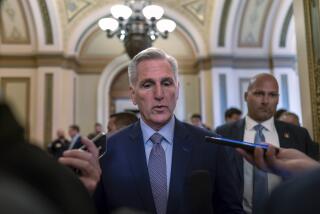Congress Reaches Its D-Day, as in Debate, on Health Bill : Reform: Senate begins contentious task today on Mitchell’s diluted version of Clinton plan. The House will be watching for signs of political hits.
- Share via
WASHINGTON — After more than a year and a half of partisan bickering, the issue of how and whether to transform the nation’s health care system has finally reached the ultimate proving ground: the floors of Congress.
This afternoon, the Senate is set to launch its debate of a sweeping proposal that represents the best approximation by Majority Leader George J. Mitchell (D-Me.) of how far that chamber is willing to go toward reaching President Clinton’s goal of guaranteeing health coverage for every American by a specific date.
The early days of the debate, which could stretch into weeks, are expected to be long on atmospherics and rhetoric but short on real action.
Indeed, no votes at all are expected until Wednesday at the earliest, and leaders have yet to agree on when to schedule the most critical vote--a test of whether to retain Mitchell’s watered-down version of Clinton’s proposal that employers be required to pay part of their workers’ health insurance premiums.
House Democrats will be watching that vote carefully as they gauge whether to put their own careers on the line by voting for the far stronger “employer mandate” contained in the bill Majority Leader Richard A. Gephardt (D-Mo.) will set before them.
However, House Speaker Thomas S. Foley (D-Wash.) denied the widely held belief--espoused in private even by some members of the House Democratic leadership--that a defeat for the mandate in the Senate automatically means the same in the House.
Pounding his desk in frustration, Foley told reporters: “I don’t think there is any evidence that this is a killer amendment, which a lot of the press seems to want to believe. You know, this is the way people get their health insurance. This is the way the country provides health insurance. This is the ordinary, standard, everyday, run-of-the-mill, American, moderate, conservative, private insurance health care plan.”
Despite Foley’s comments, the idea of the government requiring employers to provide benefits that they now offer voluntarily or through collective bargaining is far and away the most controversial element of the entire health debate, with business groups warning that it could cost millions of jobs.
Meanwhile, House leaders on Monday delayed some of the preliminaries leading up to its debate but insisted that they still will meet their latest schedule, which calls for a final vote on the bill by the end of next week.
As it now stands, all sides in the House must submit their alternatives to the Rules Committee by Wednesday, but that deadline has slipped several times already.
The final day before the official beginning of Senate debate was not an auspicious one for those who were looking for signs of a consensus, which has been lacking so far.
Sen. Phil Gramm (R-Tex.) and Richard C. Shelby (D-Ala.) announced that they are willing to use the filibuster, if necessary, to kill the Mitchell bill. Such a move would have to be supported by at least 41 senators.
“Am I willing to use every power I have as a member of the U.S. Senate to stop a government takeover of health care in America?” asked Gramm, who is one of the most tenacious opponents of the alternatives being offered by the Democrats. “The answer is yes, and I’m going to do it proudly.”
Meanwhile, the Administration intensified its sales effort.
At the White House, four Cabinet secretaries called a press briefing to argue for universal coverage, saying that incremental approaches to reform, such as that advanced by Senate Minority Leader Bob Dole (R-Kan.), actually could cause insurance premiums to rise and swell the ranks of the uninsured.
“That approach won’t work” said Donna Shalala, secretary of health and human services.
Joining her were Education Secretary Richard W. Riley, Interior Secretary Bruce Babbitt, and Housing and Urban Development Secretary Henry G. Cisneros.
Babbitt and Riley cited their own experiences as governors in warning against “piecemeal” reforms that their states had undertaken in the 1980s, which generally relied on incremental, voluntary market-driven reforms.
Such approaches “seemed fairly reasonable” at the time, but the “ironic result” was that they made things worse, Babbitt said.
With the health care reform debate about to begin in Congress, the Clinton Administration is launching a “full court press” both on Capitol Hill and in the court of public opinion, Shalala said.
First Lady Hillary Rodham Clinton has invited health care reporters to the White House for a rare session on the topic today.
Also on Monday, White House Deputy Chief of Staff Harold M. Ickes disputed a report over the weekend in The Times. The story quoted several unnamed senior Clinton advisers as saying that the President is ready to compromise and is resigned to salvaging whatever he can get from a recalcitrant Congress.
“The President has been committed all along to universal coverage. There’s been no discussion or talk in here about compromise,” Ickes said.
More to Read
Get the L.A. Times Politics newsletter
Deeply reported insights into legislation, politics and policy from Sacramento, Washington and beyond. In your inbox twice per week.
You may occasionally receive promotional content from the Los Angeles Times.









